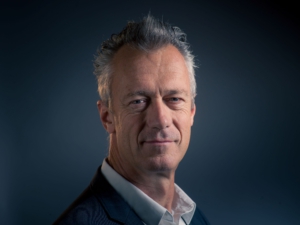As part of the 20th anniversary of Public Matters, we have developed a book which includes interviews with various interviews with professionals, entrepreneurs and experts from the public affairs sector. In the interviews they provide their views on lobbying and public affairs trends. The book will soon be presented, but in the meantime we will share several interviews via this website.
For this interview, we spoke with Niels Arntz, co-founder of Temper.
Temper is an online platform for self-employed people looking for jobs to earn extra income in hospitality, retail, logistics and charity. The online platform breaks down barriers in the labour market, but in a Dutch way. Instead of the Sillicon Valley credo move fast and break things, he looks for added value in and with the Dutch consensus decision-making system (Polder model).
Why does Temper provoke societal political discussion?
Temper is a platform for self-employed people who are looking for jobs such as in hospitality, retail, logistics and recently also in healthcare. The first version went live on the first day of 2016. It turned out to be a hit. More and more people want to work this way, where they have the initiative. I used to work in the hospitality industry. If I wanted time off, it was never really possible. With Temper, we turn this around, and place the initiative with the worker. He or she decides whether he or she wants to work. That was the world upside down. The hot issue here is that we work with self-employed people.
In the beginning, you’re pretty much in your own bubble. It’s great to grow, with 10 to 15 per cent more hours worked through the platform every month. The first time I was thrust out of that bubble was during a debate evening. I found myself in a room with 200 labour lawyers, tax consultants and temping agencies, in one of those arena settings. In my naivety, I talked about Temper’s early success and the hundred new users a day. When I told them how good things were at our company, they almost razed me to the ground. At one point, I didn’t know what to say anymore. This was at the end of 2017. Then I realised: there is a lot of dissent. I wasn’t aware of that. That immediately shows the naivety, which was also good for something, because otherwise we might never have started. That moment has been an ass-kicking in my Temper career, which I now look back on with a smile.
What is your experience with politicians and policymakers in setting up a new business?
It is quite diverse. It’s a huge journey to set up a company like this with everything that comes with it. From the start, we want to do things differently from the platforms that have come over from Sillicon Valley. I don’t want to be the party that first sets the country on fire and then maybe helps to put it out. We are a Dutch company, so that makes us quite likeable as a platform. That also has everything to do with the fact that we said from the start: we want to do this the right way and be part of the solution.
We have been proactive towards trade unions and that has resulted in cooperation with them, and we have also gone to the Tax and Customs Administration ourselves, we have entered into dialogue with members of parliament and with the Ministry of Social Affairs and that of Finance.
Our starting point is that if we want to be a sustainable part of the labour market in the Netherlands, we must also want to give something back. Then we must also ensure that the needs of the Netherlands as a whole are met. If that is your starting point, you create value. Because it’s either create value or get value out of it. Many people and companies are – often unconsciously – busy getting value out of something. But if you are busy adding value, the chance of success is much greater. Our stakeholders therefore feel that the intention is good – even if they look at it differently – and that we are looking for a win-win situation. That helps a lot. It also creates a bond of trust, which is important if we are to have any influence. You have to create a bond of trust by being vulnerable. You do that by being transparent and by giving insight. For example, we have given access to our data about 2020. That will help politicians and civil servants.
Your company is coming out of a difficult period. Can you describe it?
We started with three and the road to the ideal team has been quite turbulent. The company changes rapidly, so do the people and the team and the skills required. It was a struggle. In addition, internally we had different views on the definition of success. Will this be the new way of working or supplementary to how things are now? That is quite a difference. In the first years, it did not receive so much attention, but as we progressed, it became more important. Then came the corona crisis and that was mindblowing for us. You are constantly growing for years. We had one hundred and fifty employees. Then came the pandemic, we had some challenges in the team and we had to lay off half of the people, because 95% of the turnover was gone. From one day to the next. We had no wayout. Then we were sued by the union. That explains why we were idle, because we were shaved. We also received a visit from the Inspectorate of Social Affairs. Many external developments meant that we had to mark time. To slow down and ask ourselves the question: how do we create value again?
Many developments from outside meant that we had to sit still for a while and wait for it to blow over. We had to think: what are we going to do, how do we create value again? It was sometimes unreal to experience, but you quickly embrace it. Now that business is doing well again, it is easier to find resignation. You also urged me not to become cynical. That is what often happens in this world.
How does your culture compare to the culture of your stakeholders?
That is an insane difference. Temper is a digital space. At Temper, you can go on holiday whenever you want. I don’t care if you take your kids to school or go to the gym in the middle of the day. Do your thing. Those are my personal values: freedom, flexibility, autonomy. And I see that reflected in the culture of Temper, and also in the culture of people who work through Temper.
Our sloganwas: what can we do today to make a difference tomorrow. That changes over time. When we went up to 100 employees, it was quite difficult to work that way. Because the more you grow, the more processes you create, so things slow down. But MPs also have a fast pace. I wonder how much they can get done with all those compulsory meetings and when you see how much they are living. What is your job, at the end of the day: getting things done or meeting how you get things done?
But anyway, that’s how it works. Another report, another meeting. The question is always: which way will it go, and how will it affect Temper’s business? But most of all: how will it affect all tens of thousands of users who work via platforms? But even if the political processes are slow: you still have influence, and things are still moving in the right direction. That works well for me. I also notice that politicians are very pragmatic and understand that people who work via our platform do so on the side. They are supplementary earners in a very specific phase of their lives and they make a conscious choice.
Politicians are good at expanding the horizon. Policy officers and civil servants are very good at narrowing in. Sometimes that enlarges an issue. Take the concept of platform work, for example. In 2020, that was 6.9% of the total labour market. And then a controversial report comes out from the major banks which states that it will grow to 80% of the total labour market. If you, as a civil servant, take that out and make it representative for the whole sector, you get a distorted picture. As a civil servant, I would write all kinds of alarming proposals to curb this.
It is easier to build a relationship when you don’t need anything from anyone. Just getting acquainted without needing anything. Those are the skills that are very important. You need curiosity. You have to ask the question: how can I contribute to your success? Then people look at me: is he really saying that? But in the end, it works. I know that those people and Temper are the better for it.
‘What can we do today to make a difference tomorrow’
What is your experience of media portrayal and influence on politics?
Platforms are hot and happening. Everyone has an opinion about them. Journalists love to write about them. There is always something special to highlight: a collaboration with the trade union, for example, or a model agreement that has been approved by the tax authorities. There is always an opposing party who writes a flaming argument about why platforms are bad. And then there are questions in parliament. We have been through this three times now. This is a nice dynamic and illustrates that politicians have little time and are whispered to by stakeholders, sometimes through the media. I then find it sometimes a circus, how the answer process proceeds. Ultimately, you keep the circle going. Everyone is busy, so maybe we should be a bit more pragmatic with our time.
It does affect things I want to achieve: the model agreement of the Tax and Customs Administration has been delayed by Parliamentary questions. Maybe that is the objective of those who have whispered those questions, I don’t know. In any case, we proactively inform politicians and civil servants whether there is a possible negative or positive piece in the newspaper. I don’t always get a reaction to that, but then you hear later that they were glad to know about it. That’s how you build up the relationship of trust again.
What can politics learn from a company like Temper?
We provide insight into the new generation of workers. Ministries also need this knowledge. We are happy to offer it. We are very user focused. We only build something if the user really needs it. Politics should also be user-focused. They are representatives of the people. The question is what a round of parliamentary questions contributes. That is the perspective we offer them. It is nice to have politicians meet Temper workers during working visits. Then you really get an insight into what drives someone. Then they can see and hear it with their own eyes and ears. Prioritising and being user-focused are lessons I would like to teach politicians.














